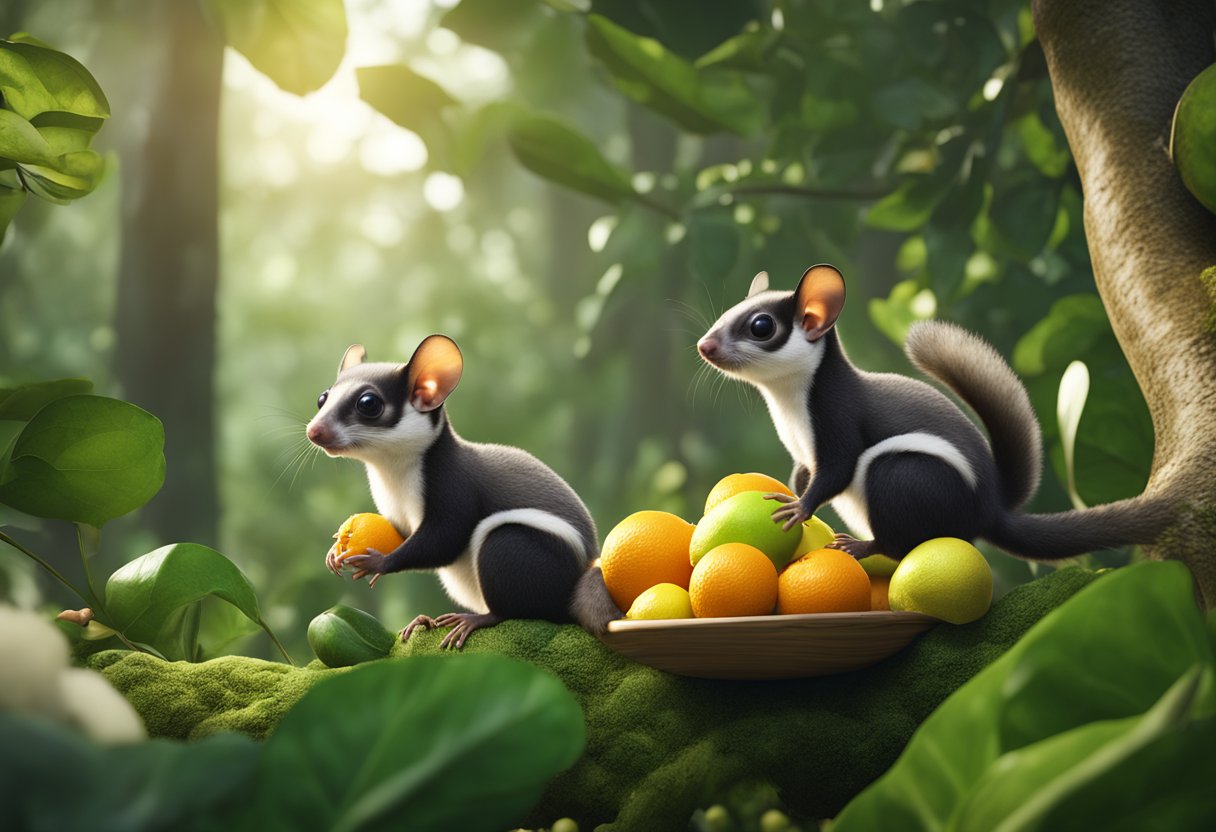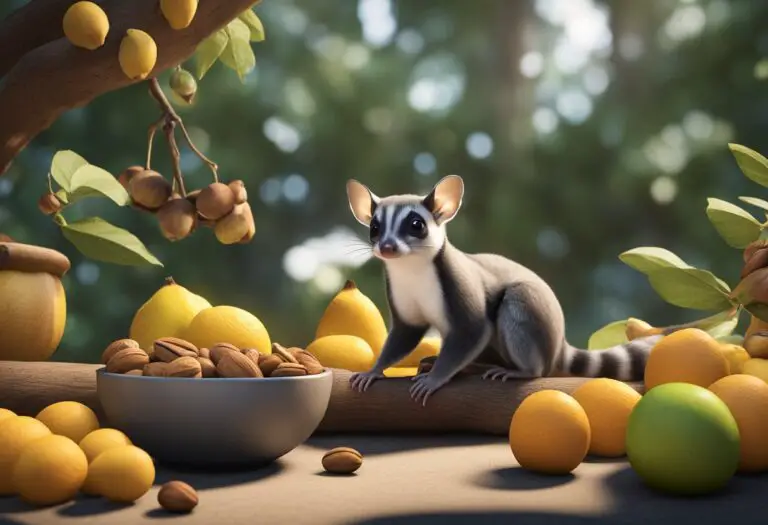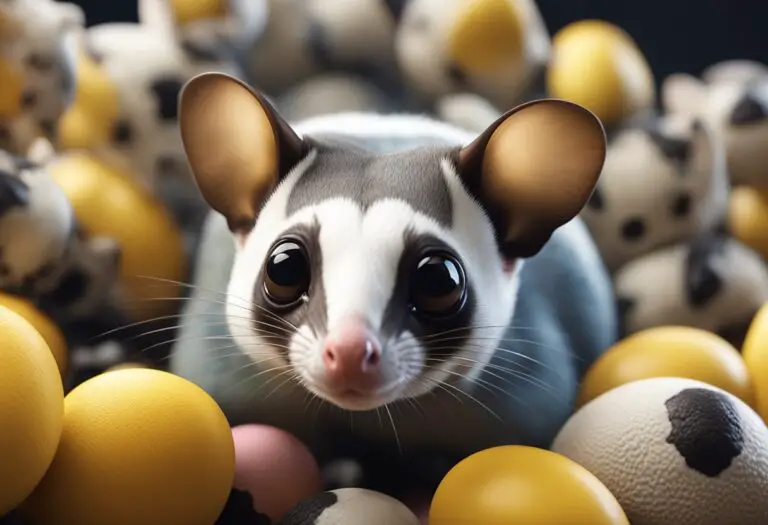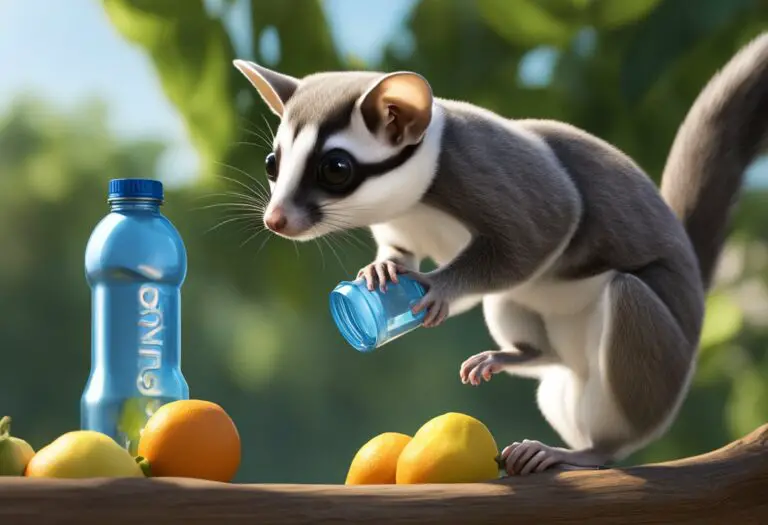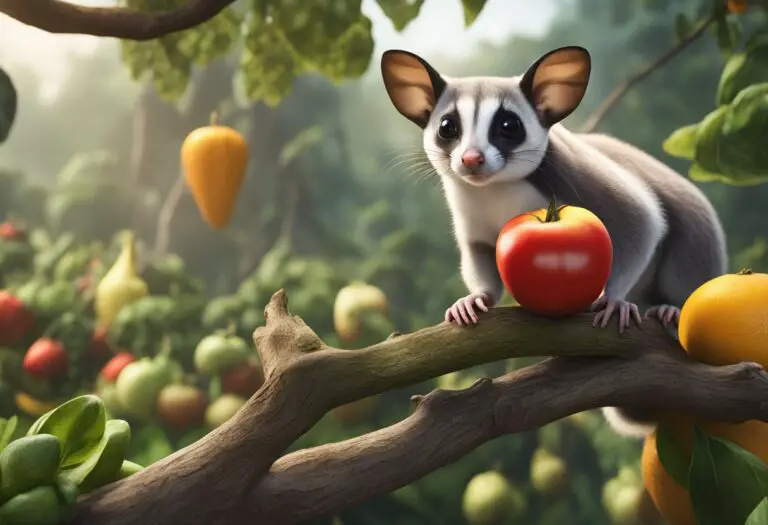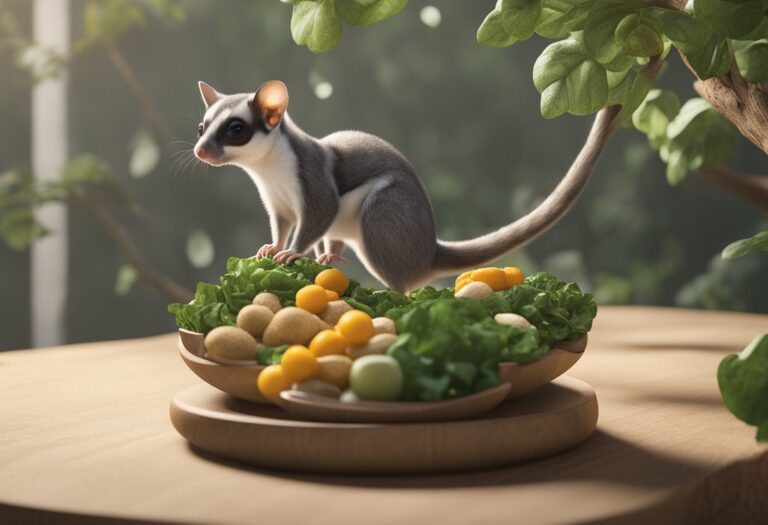Seasonal Foods for Sugar Gliders: A Guide for Owners
Did you know that sugar gliders, those adorable marsupial pets, require a carefully curated diet to thrive? These engaging exotic animals are omnivores, needing a balanced mix of fruits, vegetables, proteins, and other essential nutrients. In fact, a recent study found that providing sugar gliders with a varied, seasonal diet can significantly improve their overall health and longevity.
This comprehensive guide will explore the best seasonal foods for sugar gliders, offering insights into optimal nutrition and practical tips for owners. By following a seasonal rotation of fresh produce, you can ensure that your petite companions receive the nutrient-rich diet they need to live their healthiest, most vibrant lives.
Understanding Sugar Glider Dietary Needs
Sugar gliders are small, active animals that have unique dietary requirements compared to many other pets. To maintain optimal health, they need a balanced diet that provides the right mix of macronutrients (proteins, carbohydrates, and fats) as well as essential vitamins and minerals. A varied sugar glider diet is crucial, as these exotic pets can develop nutritional deficiencies if fed the same foods repeatedly.
Balanced Nutrition for Optimal Health
Ensuring a balanced sugar glider meal is essential for supporting the overall health and well-being of these petite marsupials. Sugar gliders require a combination of high-quality proteins, complex carbohydrates, and healthy fats to fuel their active lifestyles and support their metabolic needs. Providing a diverse array of nutrient-rich sugar glider snacks can help meet their specific nutritional requirements and prevent potential deficiencies.
The Importance of a Varied Diet
A varied diet for sugar gliders is crucial for maintaining their healthy sugar glider feeding habits and promoting long-term health. By rotating through a selection of fresh produce, proteins, and supplemental items, owners can ensure their sugar gliders receive all the necessary vitamins, minerals, and other beneficial compounds. This diverse approach helps prevent nutritional imbalances and keeps mealtime interesting for these curious and energetic exotic pets.
Seasonal Foods for Sugar Gliders
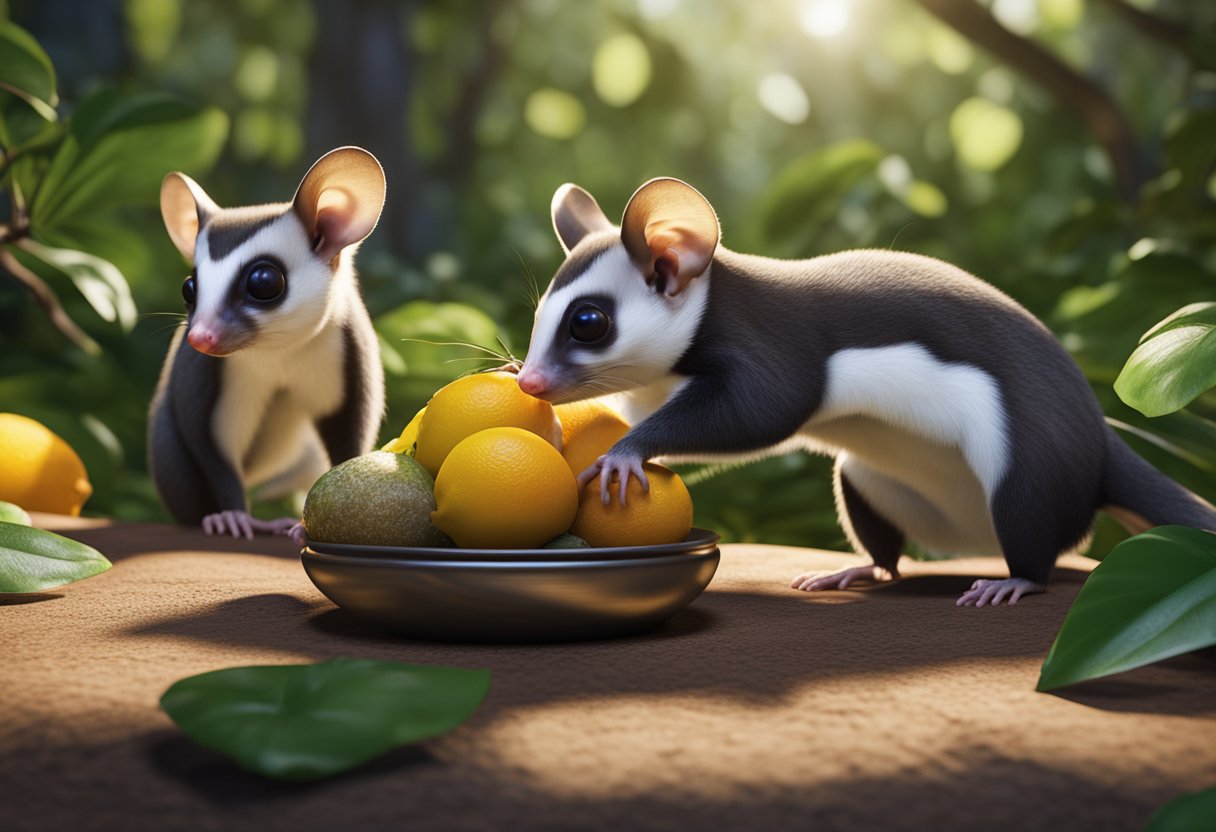
The seasonal availability of fruits and vegetables plays a significant role in determining the optimal diet for sugar gliders. By rotating through different produce items throughout the year, owners can provide their sugar gliders with a diverse, nutrient-rich menu that supports their overall health and well-being. Exploring the best seasonal foods for sugar gliders in spring, summer, fall, and winter is essential for creating a balanced, varied feeding regimen.
As the weather and seasons change, sugar gliders can benefit from a rotating selection of fresh produce that offers a wide range of essential nutrients. Owners who incorporate rotating seasonal fruits and vegetables into their sugar gliders’ diet can ensure their pets receive a comprehensive blend of vitamins, minerals, and other beneficial compounds to thrive.
By understanding the availability and nutritional profiles of seasonal foods for sugar gliders, owners can create a feeding schedule that keeps their exotic pets engaged and healthy throughout the year. This approach not only provides a varied, nutrient-rich diet but also introduces new flavors and textures to keep mealtime exciting for the sugar gliders.
Spring Produce for Sugar Gliders
As the weather warms and new growth emerges, spring is an excellent season for introducing a variety of fresh spring produce for sugar gliders into their diet. Leafy greens and fragrant fresh herbs for sugar gliders provide essential vitamins and minerals, while berries and early fruits for sugar gliders offer natural sweetness and antioxidants.
Leafy Greens and Fresh Herbs
Nutrient-dense leafy greens for sugar gliders, such as kale, spinach, and parsley, are excellent choices for spring. These vibrant greens are packed with essential vitamins, minerals, and fiber that support overall health and well-being. Fresh herbs for sugar gliders, like basil and cilantro, not only add flavor but also offer a range of beneficial compounds.
Berries and Early Fruits
Spring also ushers in a bounty of berries for sugar gliders, including juicy strawberries, blueberries, and raspberries. These early fruits for sugar gliders provide natural sweetness and a wealth of antioxidants, making them a nutritious and appealing addition to the sugar glider’s menu. Mangoes, another early-season favorite, offer a tropical twist with their creamy texture and rich flavor.
When introducing these spring items, sugar glider owners should do so gradually, ensuring a smooth transition to the new seasonal offerings. This careful approach helps prevent digestive upset and allows the sugar gliders to adapt to the changing spring produce for sugar gliders.
Summer Bounty for Sugar Glider Treats
As the summer sun warms the air, a vibrant array of tropical fruits and veggies come into season, providing a delightful bounty for sugar glider owners to explore. These fresh, nutrient-rich summer produce for sugar gliders can enliven their diet and satisfy their natural curiosity.
Tropical Fruits and Veggies
Juicy tropical fruits like pineapple, papaya, and mango burst with sweetness and an abundance of vitamins, minerals, and antioxidants that can benefit a sugar glider’s health. Crisp tropical veggies such as zucchini, bell peppers, and even the occasional slice of avocado offer a savory counterpoint, delivering essential nutrients to support a sugar glider’s active lifestyle.
Nutritious Sugar Glider Snacks
In addition to the seasonal tropical fruits and veggies, owners can also incorporate nutritious sugar glider snacks into their pets’ summer menu. Cooked sweet potatoes or unsweetened applesauce can provide a tasty and wholesome treat, supplementing the fresh produce and ensuring a well-rounded, balanced diet for these exotic pets.
| Summer Produce for Sugar Gliders | Nutritional Benefits |
|---|---|
| Pineapple | High in vitamin C, manganese, and bromelain, a digestive enzyme. |
| Papaya | Rich in vitamins A, C, and K, as well as folate and antioxidants. |
| Mango | Offers a blend of vitamins, minerals, and fiber to support overall health. |
| Zucchini | Provides dietary fiber, vitamins, and minerals like potassium and vitamin C. |
| Bell Peppers | High in vitamins A and C, as well as antioxidants that boost immunity. |
| Sweet Potatoes | An excellent source of beta-carotene, vitamin A, and complex carbohydrates. |
Autumn Harvest for Exotic Pets
As the weather cools and the leaves change, autumn ushers in a new selection of fresh produce that can be incorporated into a sugar glider’s diet. This seasonal bounty offers a wealth of nutrients and flavors to keep these engaging exotic pets thriving throughout the colder months.
Squashes and Root Vegetables
Autumn is the prime season for squashes and root vegetables, which can provide sugar gliders with complex carbohydrates, fiber, and a range of essential vitamins and minerals. Butternut squash and acorn squash, for example, are excellent sources of vitamin A, vitamin C, and complex carbohydrates that can support sugar gliders’ active lifestyles. Root vegetables like carrots and sweet potatoes are also nutrient-dense additions to the autumn menu, delivering a boost of beta-carotene, vitamin C, and other beneficial compounds.
Nutrient-Rich Fall Fruits
The autumn harvest also brings a variety of flavorful and nutrient-dense fruits that can be introduced to a sugar glider’s diet. Apples, pears, and persimmons are all excellent choices, offering a natural sweetness and a range of vitamins, minerals, and antioxidants. These fall fruits can add valuable diversity to the sugar glider’s menu while satisfying their sweet tooth in a healthy way.
Winter Offerings for Sugar Gliders
As the colder winter months arrive, sugar gliders can still enjoy a varied and nutritious diet. Key items to include during this season are citrus fruits and other winter-hardy produce that offer essential vitamins, minerals, and antioxidants.
Citrus and Other Winter Fruits
Citrus fruits like oranges, grapefruits, and mandarins are excellent sources of vitamin C, which can help boost the sugar glider’s immune system and support overall health. These bright, flavorful fruits are widely available during the winter season and can be a welcome addition to the sugar glider’s menu.
Beyond citrus, other winter fruits such as kiwi and pomegranate can also provide a range of beneficial nutrients for sugar gliders. Kiwi is rich in vitamin C, while pomegranate offers a unique blend of antioxidants and fiber that can contribute to a well-rounded diet.
By incorporating these seasonal winter produce items, sugar glider owners can ensure their pets receive a diverse array of essential vitamins, minerals, and other compounds to support their active lifestyles and overall well-being throughout the colder months.
Rotating Seasonal Foods for Variety
To ensure a well-balanced and varied diet, sugar glider owners should rotate through different seasonal produce items throughout the year. This not only provides a diverse range of nutrients but also keeps mealtime interesting for their exotic pets.
Meal Planning for Sugar Gliders
When planning sugar glider meals, owners should consider the availability and nutrient profiles of various seasonal fruits and vegetables, ensuring that their sugar gliders receive a comprehensive mix of essential vitamins, minerals, and other beneficial compounds.
Preparing Fresh Produce Safely
Proper preparation, such as washing and chopping the fresh produce, is also crucial for maintaining food safety and preventing potential health issues. By taking the time to thoroughly clean and prepare the seasonal foods, sugar glider owners can provide their pets with a safe and nutritious diet.
Natural Treats and Supplementation
In addition to providing a varied diet of seasonal fruits and vegetables, sugar glider owners can also offer their pets occasional natural treats and supplementation to support their overall health and well-being. These supplemental items can be used to enhance the sugar gliders’ nutritional intake, especially if certain produce items are not readily available or included in the regular rotation.
Occasional Sugar Glider Treats
While the primary focus should be on a balanced, seasonal diet, sugar gliders can enjoy small portions of special, natural treats as occasional rewards or enrichment. Owners can offer cooked, unsweetened proteins, such as shredded chicken or hard-boiled eggs, or honey-based items in moderation. These treats should be limited, however, to avoid disrupting the sugar glider’s overall dietary balance and nutrient intake.
Vitamin and Mineral Supplementation
Depending on the specific seasonal foods included in a sugar glider’s diet, vitamin and mineral supplements may be necessary to ensure that all of their nutritional needs are met. This is particularly important if the available produce does not provide a comprehensive range of essential nutrients. Owners should consult with a veterinarian who specializes in exotic pets to determine the appropriate supplementation regimen for their sugar gliders, taking into account individual health factors and dietary considerations.
Adapting to Availability and Budgets
While providing a diverse, seasonal diet is ideal for sugar gliders, owners may need to adapt their approach based on local availability and budgetary constraints. Choosing cost-effective seasonal produce, such as in-season fruits and vegetables, can help minimize expenses while still offering nutritious options.
Owners can also consider incorporating frozen and dried options into their sugar glider’s diet, as these items can provide essential nutrients and expand the range of available foods throughout the year. By being flexible and creative with their ingredient selection, sugar glider owners can ensure their furry companions receive a balanced, varied diet even when faced with limitations in accessibility or budget.
Transitioning to New Foods Gradually
When transitioning sugar glider diet or introducing new foods to sugar gliders, it’s crucial to do so gradually. Owners should take a careful and measured approach to avoid any digestive upset or other health issues in their exotic pets. The key is to introduce new seasonal items one at a time, closely monitoring the sugar glider’s response and adjusting portion sizes as needed.
This slow transition allows the sugar glider’s digestive system to adapt to the new foods, ensuring a smooth and successful dietary change. By taking the time to carefully incorporate fresh produce and other seasonal offerings, owners can help their sugar gliders seamlessly adjust to a more varied and nutritious diet.
Monitoring Sugar Glider Health
Closely monitoring a sugar glider’s health and response to their seasonal diet is crucial for ensuring their overall well-being. As responsible pet owners, it is important to be aware of potential signs of nutritional deficiencies in sugar gliders.
Signs of Nutritional Deficiencies
Owners should closely observe their sugar gliders for any changes in physical appearance or behavior that may indicate a nutritional imbalance. Indicators such as poor coat condition, lethargy, or altered feeding patterns can signal the need for dietary adjustments. Promptly addressing these issues is essential to maintain the sugar glider’s optimal health and well-being.
Consulting a Veterinarian
If any concerns arise regarding a sugar glider’s health or nutritional status, it is recommended to consult a veterinarian who specializes in exotic pet care. These professionals can provide valuable guidance on the sugar glider’s dietary needs, offer recommendations for supplementation, and help identify and address any underlying health issues. Seeking expert advice is crucial for ensuring the long-term health and happiness of these unique and cherished companions.
Conclusion
Providing a varied, seasonal diet is essential for maintaining the health and well-being of sugar gliders. By rotating through a range of fresh produce, owners can ensure their exotic pets receive a comprehensive blend of essential nutrients to support their active lifestyles and unique dietary requirements. With a little planning and adaptation, sugar glider owners can create a balanced, nutritious menu that keeps their furry companions thriving throughout the year.
A diverse, varied diet is crucial for sugar gliders, as it ensures they receive all the necessary vitamins, minerals, and other beneficial compounds their bodies need. By incorporating a rotation of seasonal foods for sugar gliders, owners can provide their pets with a healthy sugar glider feeding regimen that caters to their specific nutritional needs and prevents the development of any deficiencies.
Ultimately, the key to a thriving sugar glider is a well-planned, balanced sugar glider diet that adapts to the changing seasons. With a little effort and dedication, sugar glider owners can create a truly nourishing and enjoyable feeding experience for their beloved exotic companions.

